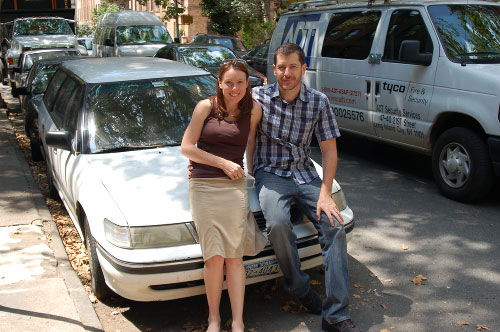Introducing La Ruta del Voto Latino – Road to the Latino Vote
Today Feet in Two Worlds introduces a new feature, La Ruta del Voto Latino – Road to the Latino Vote, which will tell the story of Latinos in the 2008 election. Independent journalist Diego Graglia is taking a two-week road trip from New York City to Mexico City, stopping in urban, suburban and rural communities along the way for an in-depth and intimate look at Hispanic voters in an election year when the Latino vote is expected to be crucial in many states and many regions of the country. You can follow Diego here on the Feet in Two Worlds blog and on his bilingual blog www.newyorktomexico.com. In addition to regular blog posts, Diego will be producing audio and video podcasts and radio stories about his trip. I invite you to check back frequently to see what Diego discovers during his travels. You can leave comments for him here or contact him directly at nydf@diegograglia.net. As Diego and his girlfriend Amy leave New York we wish them buen viaje.
John Rudolph – Executive Producer, Feet in Two Worlds
Monday morning, as you wake up and make coffee, I’ll probably be driving under the Hudson River, having my morning mate and exiting New York once more. After five and a half years there, I moved to Mexico City, el D.F., at the beginning of this year. Now, I’m uniting the two cities in a roadtrip that will take me through the nation’s capital and the Mid-Atlantic region, the Deep South, Texas and the desert of northern Mexico.
While this trip was born as a private adventure, my journalistic genes could not let such a big opportunity to tell good stories pass without doing something about it. Of course, the biggest story in the land right now is the presidential election, with two candidates whose life stories could not be more compelling, and several issues –the war, the economy, immigration, the environment- triggering the most passionate opinions.
The Latino population in the U.S. has been growing for decades, and Latinos recently became the biggest minority in the country. Of course, this categorization is a little weird, since Latinos can be black, white, Native American, and a lot of other things – sometimes belonging to more than one minority at a time. (I, for one, am quite Caucasian, bear an Italian last name and speak English with a pree-ttee strong Latino accent.) Nevertheless, the existence of Latinos as a group does count, big-time, in terms of the ballots that will be added up on November 4.
By now, American politicians know that badmouthing Fidel Castro –who’s pretty much retired, anyway– is not going to cut it in terms of winning over Latinos. A visit to the Basílica of Guadalupe in Mexico City may help (right, Senator McCain?), since Mexicans are a majority of the people of Latin American descent in this country. But it has become quite clear that the Latino electorate is too diverse to be put into one big grab bag, una bolsa de gatos. (Yep, that is “a bag of cats.”)
As soon as our gallant 1992 Subaru Legacy station wagon, El Rayo Blanco (uh-huh, that’s The White Lightning) exits the Jersey City side of the Holland Tunnel, I will start bringing you the faces, voices, ideas and feelings of that diverse Latino population. The Dominicans who live in the neighborhoods above 137th Street in Manhattan, the Mexicans who work in poultry factories in rural North Carolina, the few Hispanics that remained in a Florida Panhandle town after an immigration raid, the Texan families who’ve been Americans for several generations, Hispanic last names and all.
I will visit Prince William County in Virginia, where the debate over undocumented immigrants has been intense, and where local authorities are enforcing federal immigration law. I will talk to a Mexican activist in Greenville, N.C., who’s been advocating for the rights of rural workers in the area for 20-plus years. I will watch party activists working hard everywhere at registering Latino voters, trying to woo them to one side or the other.
The site where all this will go up, www.newyorktomexico.com, has many interactive features, so I hope to hear from readers from all over the country – and from abroad, too. We want to know what people – Latino and non-Latino – think about the election, what issues they care about, and their opinions of the two candidates. By the time we finish the American leg of this trip, entering Mexico from Laredo, Texas, we should have some clearer – and distinctly grass-roots answers to those questions.
Oh… if you’re along our route, please don’t forget to recommend the best Latin American eatery in your town – this is going to be hard work and we will need to replenish our energy often.
* Diego Graglia is an Argentinean journalist with a strong interest in the relationship between the U.S. and Latin America, and Latino culture and society in the United States. He can be contacted by email at nydf@diegograglia.net, on Twitter at @nydf, and through Live Chat and comments on www.newyorktomexico.com.


